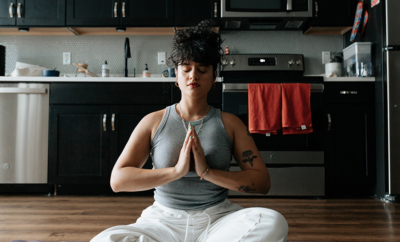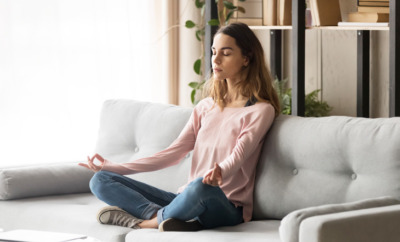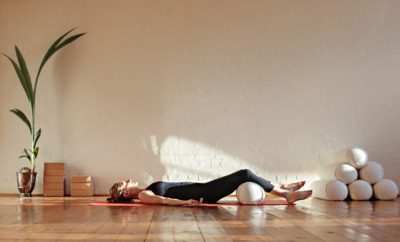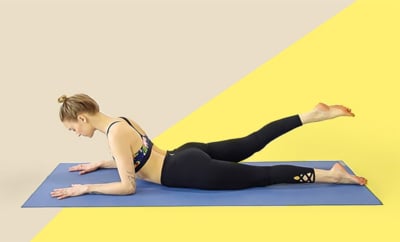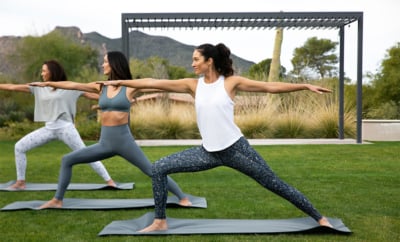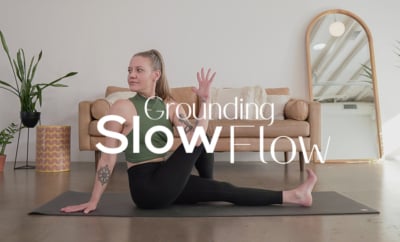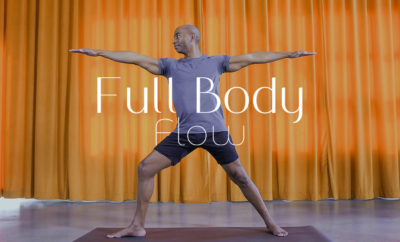3 Simple Reasons EVERYONE Should Meditate (From “How Not to Be a Hot Mess”)

When I started my own meditation practice back in 2001, there was practically no decent meditation research on the impacts of meditation on the brain, emotions, or behavior.
In fact, for my senior college thesis, I told my advisor I wanted to write a paper on the impacts of meditation on kids with ADHD. She looked at me pityingly and said, “That’s very nice. But what on earth does it have to do with psychology?”
I wrote the paper anyway. And the very next year, Richard Davidson, the renowned neuroscientist and public intellectual, started publishing really good, hard-hitting, hard-science research on meditation.
6 Key Benefits of Meditation (Backed by Hard Science!)
He triggered an avalanche. These days, over 7,000 studies have been published – so many it’s hard to even sift through the findings. So I’ll break down the meditation research for you. Really simple. Here are the top three reasons to meditate:
- It lowers stress
- It helps you focus
- And it might make you a better human
Meditation Lowers Stress
If there’s one thing meditation definitely, definitely, definitely, for-sure-according-to-science does, it’s lower stress.
There are a ton of studies that show this. Good studies. Really good studies. Studies with active control groups, and biomarkers, and robust samples, oh my! I won’t get into every one of these studies right this moment, but here’s one to give you just a taste.
In this particularly fun experiment, scientists at Stanford University took a bunch of folks with social anxiety disorder and asked them to write down their worst anxiety experiences.
Sound awful? Keep reading.
They wrote about things like being trapped in a subway car while having a panic attack. Or being forced to give a speech in front of derisive classmates.
Then the researchers running the experiment put these same subjects in an fMRI machine, which is like being wrapped in a whirring, clacking, sewer pipe, and they read back to them the very stories they had just written, along with their most damning self-assessments, such as, “I am incompetent.”
Unsurprisingly, the circuits of their brains related to stress and anxiety lit up like a Christmas tree.
The experimenters then split the group in two. They taught one group mindfulness techniques and they taught the other group to do arithmetic to distract from negative thinking. And then they ran all the subjects through the fMRI machine all over again, complete with listening to their anxiety journals and painful self-assessments.
Any guesses about what happened?
Spoiler: The arithmetic group didn’t improve. They were still super stressed by the experience. But the group that learned mindfulness? They saw dips in their brains’ stress response – they were less freaked out than they’d been before.
Practice These 8 Simple Exercises to Infuse Your Day With Mindfulness
Other meditation research has compared mindfulness to cognitive reappraisal, mindfulness to relaxation, and mindfulness to just being put on a waitlist. And in each case, mindfulness lowered stress significantly more than the competing treatment.
So we can say with real confidence that mindfulness lowers stress levels. But how? Good question. Let’s take a look.
We can say with real confidence that mindfulness lowers stress levels.
Mindfulness, as we just mentioned, is the simple act of being aware. Non-judgmentally and on purpose.
How Mindfulness Actually Works + A Practice You Should Try The Next Time You’re Feeling Off
Simple enough, right?
But the crazy thing is that being aware, non-judgmentally and on purpose, breaks the cycle of rumination. And rumination, it turns out, is a hellacious contemporary affliction, a gruesome epidemic of the soul, the psychological cholera of hyper-tech, post-industrialist societies.
To understand this, it’s helpful to get a handle on how our stress response works.
Humans evolved in dangerous environments. Every once in a while, something super bad happened, and our bodies needed to respond.
Our heart rates would go through the roof, our blood would be pulled out of our extremities, and our nervous systems would go berserk. That way we could run like hell or fight like hell or just freeze and play dead.
Learn About the Parasympathetic vs. Sympathetic Nervous Systems and How Yoga Affects Each
Way back then, though, it was pretty obvious when the danger had passed. And when it passed, the body would calm down, the mind would chill out, and we’d go back to happily picking berries and gossiping about who we wanted to have babies with.
Back then, there wasn’t a lot of room for rumination. There was danger, it passed, we moved on.
These days, though, your nervous system responds to a hostile email or a politically charged news report or a coworker saying something jacked in much the same way your ancestors used to respond to a saber-toothed tiger.
Being aware, non-judgmentally and on purpose, breaks the cycle of rumination.
Only now, email and news stories are way more prevalent than saber-toothed tigers ever were. So the body ends up in a continual state of activation, making your emotions and thoughts just spin and spin and spin.
And spinning thoughts are super bad for you. They super freak you out. And they lead to a host of stress-related bad stuff like depression, anxiety, and any number of chronic physical ailments.
When you practice the simple act of bringing attention back to your left foot, or your breath, or even nonjudgmentally bringing awareness to your thoughts, the spinning mind slows its roll and you’re more able to relate to your experience in a calm, collected, and warm-hearted way.
Stress levels go down. A kind of friendliness develops. And all this is a very good thing.
10 Instant Stress Busters You Can Turn to When Stress Strikes (According to Science)
Meditation Also Helps You Focus
At first blush, increased focus probably doesn’t sound like such a big deal. But think about it.
Pretty much every worthwhile thing you do – from playing an instrument to cooking a meal to writing code – requires some level of baseline attentiveness. And the more attentive you are, the better things go.
Take, for example, your daily workflow. You get to your desk. Check your email. Check your voicemail. Check your Slack channel. Check your to-do list.
Three people stop by asking for stuff. You get a text from your mom. You get a news alert on your phone. And then somehow you have to find a way to sift through the noise and get cracking.
This is where a lot of people get stuck. There’s so much information. Like a flood of beeping, buzzing, binging noise, and each piece of information is waving flags and flashing lights telling you it’s really, really, really important.
So how do you actually choose what to focus on first? And then next? And on and on, moment to moment, throughout your day?
Well, mindfulness training – just that simple act of being intentionally aware again and again – can help. But don’t take my word for it. Let’s take a look at some of the meditation research:
- People who take an eight-week mindfulness-based stress reduction course see a big jump in focus
- Long-term meditators show far better focus than well-matched controls
- People who do a three-month retreat see a big bump in focus, and it stays with them long after the retreat ends
- Ten minutes of mindfulness heals the break in focus associated with multitasking
- Eight minutes of mindfulness decreases mind-wandering
- Ten hours of mindfulness training increases baseline levels of both focus and working memory
So mindfulness works a kind of focus magic. Coming back to the breath again and again trains you to bring your attention to just about anything.
If you can pay attention to your breath, you can pay attention to your work. You can pay attention to your pickleball game. You can pay attention in bed.
In other words, your sustained awareness in all these areas will likely get a good little bump. And the more you practice, the bigger the bump you’ll see.
How to Add Mindfulness to 5 Activities You Already Do on a Regular Basis
Meditation Research Suggests Meditation Might Make You a Better Human
A few years ago, a super-cool scientist named Helen Weng did a study at the University of Wisconsin-Madison, where she was then a graduate student. It was published in one of the best psych journals around, and the results blew everybody away.
Helen wanted to study compassion. In particular, she wanted to know if meditation training could, perhaps, increase compassionate action.
To find out, she took some undergrads and divided them into two groups. The groups were just about identical in age and gender, and at the beginning of the study, they tested fairly evenly on baseline compassion rates.
She then sent the two groups through two different trainings. The first group went through a two-week meditation training focused on compassion. The second group went through a two-week cognitive reappraisal training that was designed to increase positive thoughts.
To measure progress, Helen gave everybody an fMRI scan before and after the trainings. At the end, she also had everybody play a game that was designed to test altruism.
For the game, she gave everybody 20 bucks. Then, during the game, participants in the study watched a “dictator” steal money from a “victim.”
Of course, the dictator and victim weren’t real players, but the study subjects didn’t know that. They just knew that they had this 20 bucks that they’d been given.
And they knew they could give some of that money to the victim. And if they gave some of their money to the victim, the rules of the game would force the dictator to reimburse the victim.
Maybe meditation can make us better humans too – more compassionate and more ready to respond to others.
In other words, they could give some of their very own money – money they’d earned from being in this arduous study, to right the wrong.
Curious what Helen found?
First off, she found in her meditation research that those who underwent the meditation training showed greater activation in the brain circuits usually associated with empathy, emotion regulation, and positive affect. So, that’s already interesting.
But here’s the real kicker: the folks who did two weeks of compassion meditation gave nearly twice as much money as the other group.
So meditation training not only impacted the way people felt about the victim (that’s the brain part), it also changed the way they acted toward the victim. They were literally more willing to make a sacrifice to improve another person’s situation.
Pretty cool, right?
So maybe meditation can make us better humans too – more compassionate and more ready to respond to others.
Adapted from Ch1_15-27 How Not to Be a Hot Mess: A Survival Guide for Modern Life by Craig Hase and Devon Hase © 2020 by Craig Hase and Devon Hase. Reprinted in arrangement with Shambhala Publications, Inc. Boulder, CO.
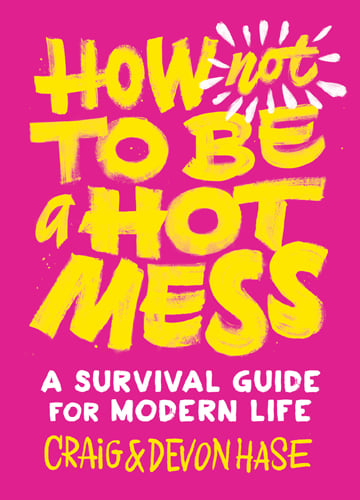


This Month's Letter
From the Editor
Monthly motivation and food for
thought from our founder.


